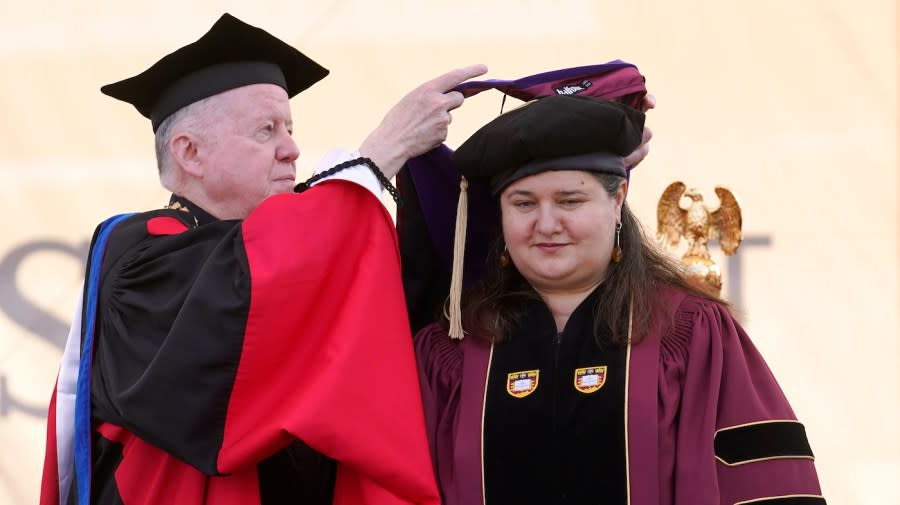Ukraine’s US ambassador breaks convention during desperate times
Oksana Markarova, Ukraine’s wartime ambassador to the U.S., has had to step out of her comfort zone to be more insistent and “unconventional” when advocating for the existential needs of her country in Washington.
“When you develop relations, you need to be diplomatic, you need to be polite, you need to wait sometimes — and that’s something that I had to change after 24th of February [in 2022],” Markarova said in an interview with The Hill, citing the day of Russia’s full-scale invasion on her country.
Markarova is Kyiv’s point person on pushing for weapons, economic assistance, vocal support and leadership from the most powerful country in the world — one whose support is increasingly coming under pressure from GOP critics.
Best Holiday Deals

“It’s always not easy. I mean the previous four supplementary budgets were not easy,” she said when asked about her task to bring President Biden’s latest request for more than $60 billion in support for Ukraine over the finish line.
“These four supplementary bills that were to support Ukraine in the past, they were very critical for us, we’re very grateful for them. But we believe they’re also very important for the U.S. as a leader of the free world.”
A new generation of women ambassadors
Markarova is also Ukraine’s first woman ambassador, serving at a time where more legacy diplomatic missions have also, for the first time, sent women envoys. This includes the United Kingdom, Canada and Italy, to name a few. The European Union is dispatching its first woman ambassador to Washington later this year.
Greece’s first woman ambassador, Alexandra Papadopoulou, told The Hill in 2020 that these female diplomats started a Whatsapp group. Markarova said she’s a member.
“Working with so many female ambassadors has been a game changer,” she said.

When asked if working in Washington as a wartime ambassador has changed her personality, Markarova points to a story about Israel’s prime minister during the 1973 Yom Kippur War, the Kyiv-born Golda Meir.
As Israel was under surprise assault from the Arab armies invading from Egypt and Syria, Meir was on the phone with her ambassador in Washington telling him to wake up the White House at 3 a.m. and to send more weapons to her country.
“Call when you need to call, and talk to people when you need to talk to people, and not be shy about reaching out to whoever you need to reach out because the life of your country, and your countryman and your family depends on it,” she explains about the lesson from the story.
“We had to become more unconventional and sometimes, not always adhere to the diplomatic protocols.”
Russia’s war in Ukraine has now lasted more than 21 months, and expectations are that Kyiv’s efforts to rout all of Russia from its territory is going to be a years-long battle.
Markarova said she and the team at the embassy have found an equilibrium for their work, compared to what was frenetic and all-consuming in those first few days, weeks and months after Feb. 24.
“People see you, they keep asking, ‘How are you?’ And how can you be when there is war back home? But I think all of the team here, we have found our new reason or new balance, so to say. And we can even say that we’re fine,” she said.
“Every day that we’re getting closer to victory; every day that we can secure more weapons or more support; every day that we talk to more people is a good day. But, of course, we’re not completely fine.”
The Ukraine House
Markarova arrived in Washington in April 2021, and her first seven months were spent working on two fronts.
Publicly, she was laying the groundwork for Ukrainian President Volodymyr Zelensky’s first Oval Office visit with President Biden and to solidify language on two documents that would establish a foundation for a new era of the U.S.-Ukraine relationship — a Strategic Partnership Charter and Strategic Defense Cooperation.

Privately, discussions were being had about how their public work, actions and statements could signal to Russian President Vladimir Putin that any further incursion into Ukraine would be disastrous for his country, which had since 2014 been occupying the eastern territories of Ukraine’s Donbas and the Crimean peninsula.
“And we were thinking on, A) How do we strengthen our defense cooperation, get more weapons, to show [Moscow] that it’s going to be too expensive for Russia, and that we will be able to inflict unbearable pain for them, if they attack,” Markarova said of the thinking at the time.
The ambassador also worked on issues of economic resilience for Ukraine, laying the groundwork for deeper ties with the International Monetary Fund that has been the intermediary for billions of dollars in financial assistance from the U.S.
Those funds have allowed the Ukrainian government to pay the salaries of teachers, health care workers, provide for pensioners, and other budget requirements that help it function in the midst of war.
On another front, Markarova was working on a passion project: to open “Ukraine House” in Washington to serve as a hub — separate from the embassy — that could be used to promote Ukrainian culture.
It has since served as an extension of Ukraine’s wartime efforts — organizing fundraisers for weapons, drones, reconstruction or recovery. It has also hosted press conferences about holding Russia accountable for its violations of international law, atrocities against civilians and the crime of aggression against a sovereign nation.
“This is my pet project. It’s my baby,” Markarova said of the two-story brick building in Washington’s Kalorama neighborhood. It was officially opened in September 2021 when Zelensky came for his first meeting with Biden.
“He said, ‘Oh, you said you were going to open the Ukraine house. Let’s do it when I’m there,’” Markarova described the Ukrainian president saying to her. “So that pretty much accelerated the timeline of the preparation.”
‘Have to act’
In the months leading up to February 2022, alarm was growing in Washington and around the world that Russia was poised to launch an attack against Ukraine.
Markarova and the embassy were preparing a number of contingency plans in the event that Russia would launch its full-scale invasion, focused on how the embassy would operate and coordinate with Kyiv, how to build in redundancy to communication systems in case they were cut.
It was no secret the threat level was high. The Biden administration was convening extraordinary diplomatic meetings with the backing of NATO to warn Russia from launching an invasion, and dispatching CIA Director Bill Burns to Moscow to personally try to walk back Putin from the ledge.
“There was a lot of nonpublic preparatory work that went into this, just in case — we were changing the protocol from time to time,” she said.
“But of course, when it happened, that’s when suddenly you just have to act.”

Markarova points out the extraordinary circumstances of the moment, that social media and smartphones transmitted images of Russia’s invasion in real time, in addition to prominent media being in the country at the time of the invasion, as important in getting the world — but most importantly the U.S. and Americans — on board to support Ukraine.
And that the messages are personal, too. From Zelensky’s cellphone video from the government compound in Kyiv, proving that he was alive and in the capital — to Markarova’s own communication with her husband, who was evacuating their parents from in and around Kyiv.
“I’m yet to find, or to meet people here, who I would talk to, and explain it to them and show them, and show them the messages on my phone, or show them the videos that my husband sent me when he was there from the day one of this full-scale aggression, that people would say, ‘I don’t think we should help.’ … The majority of people say, ‘Oh, my God, this is horrible. This is important for all of us.’”
But that has been challenged by an oversaturation of information, the length of the war and fighting and the emergence of new crises around the world, particularly Hamas’s attack on Israel and the subsequent war in Gaza.
Markarova said the ups and downs in support for Ukraine reinforces the importance of the embassy’s mission and its work to communicate with people.
“I think we should be even more active, and this is what we’re doing and have even more events to champion Ukrainian culture, Ukrainian history, to tell more people about how — even though we’re so far away from the U.S., but I think we’re very similar to Americans,” she said.
For the latest news, weather, sports, and streaming video, head to The Hill.


